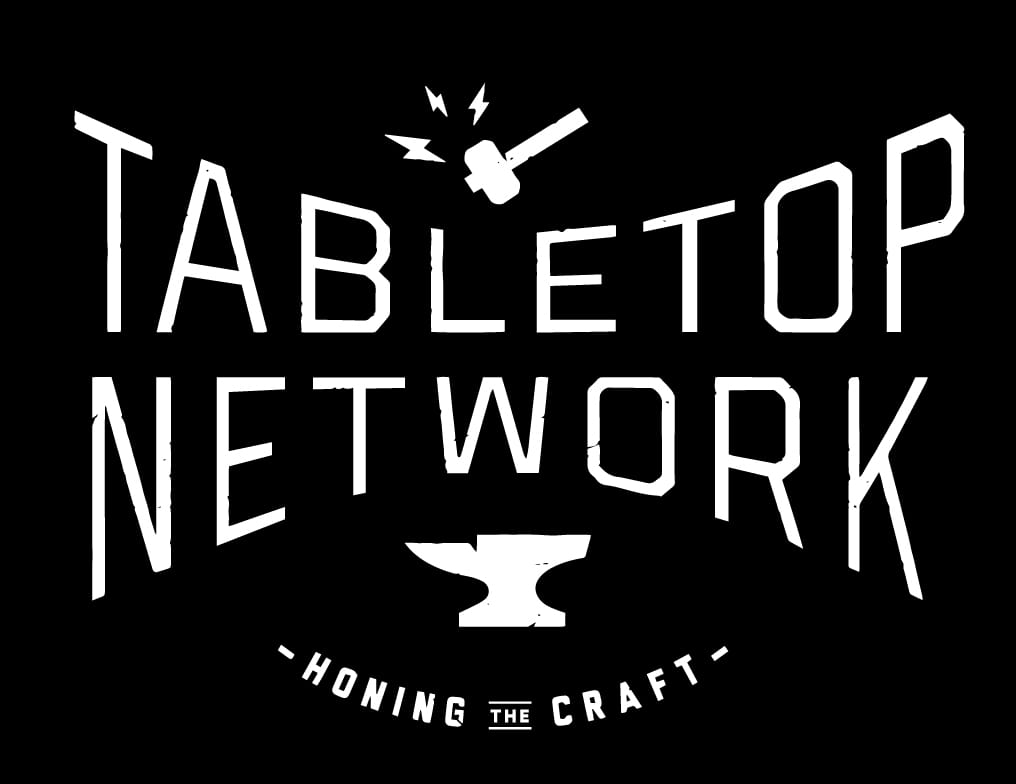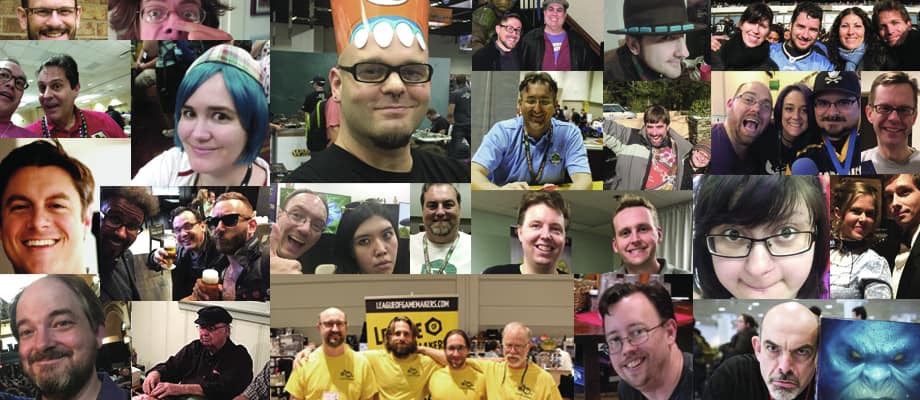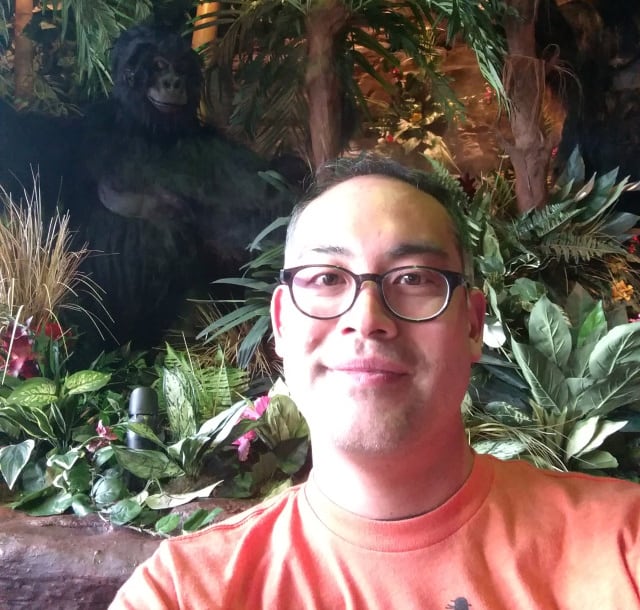
Maybe no one in the board game industry has worn as many different hats as Dale Yu. He is the Editor in Chief of OpinionatedGamers.com, one of the best board game review websites where he personally has done over 250 reviews. He is a board game developer for hire with many beloved games in his development credits including Dominion, Suburbia, and Castles of Mad King Ludwig. He is the designer of several kids games, including Flizz & Miez, a Kinderspiel des Jahres Nominee in 2014, and a couple of Agricola expansions. He is an admin for the BoardGameGeek website and a jury member for the International Gaming Awards. I spoke with Dale by phone to talk about Opinionated Gamers, being a developer for Dominion and to hear his perspective on the board game industry.
What is Opinionated Gamers and what is its mission?
Opinionated Gamers has been around for 6 years, starting in 2011. We are an independent game blog for game reviews and commentary with 30-35 writers. When we started we were mostly writers who wrote for Board Game News before it was bought out by BoardGameGeek and now is part of the BoardGameGeek home page which everyone reads.
Board Game News was founded by Rick Thornquist. He was the first person to go to Essen and write reviews. Then Eric Martin took over. There were a dozen of us writing essays about gaming that didn’t fit on BoardGameGeek. Back then everything [on BoardGameGeek] needed to be attached to a game. There was no place to talk about a random mechanic. Then Board Game News went on its own and all the non-news writers decided to stick together and be our own site.
Over the years, it’s become 80% to 90% game reviews. One of the things about [BoardGameGeek] is that when people write things there or do videos like Tom Vasel or Ender’s Review, their content is gone within a day. It’s difficult for people to find information on [BoardGameGeek]. We formed our own site. We only do 1 piece a day. We publish 150 days/year. We try to limit to 1 per day. Everything we write has a full day for people to come see it and that limits the noise.
We are completely independent and voluntary and don’t have advertising or sponsorship. We can write whatever we want and not report to anyone. We have an interesting group of writers, veteran game designers and publishers.
ONE OF THE HALLMARKS OF OUR SITE IS OUR GROUP REVIEWS. ONE PERSON DOES A MAIN REVIEW AND THE REST OF THE WRITERS CAN WRITE THEIR OWN MINI-REVIEWS. YOU GET A BETTER REVIEW OF THE GAME WHEN YOU GET 4 OR 5 OPINIONS AT THE SAME TIME.
We have 140 games in a [Google Documents] spreadsheet where people can rate games. Someone could see that 5 other people had played a game and that might spur a review.
How did you select these Opinionated Gamers? Like Nick Fury selecting the Avengers or did people approach you?
When we started, the first 12-24 people were everyone who wrote for Board Game News who wasn’t Eric Martin. Far as adding people, it was people I saw at conventions or recommended by other writers. Two additions contacted me out of the blue and liked what we wrote and wanted to join. We try to get people who are veterans, no necessarily insiders–people who have a good basis to write about games. It becomes sticky since some of us are game designers. We want to manage conflicts of interest. If we were talking good or bad about someone’s games, it might start a flame war. When I write about my own games, I always make clear if I am involved or not. I try not to write about games I work on. Every time I review a Bezier game, I try to make it clear what the relationship is.
Talk about some of the personalities on Opinionated Gamers.
We have people from all walks of life. We have people who wear multiple hats. Greg Schloesser is one of the more prolific writers. He is editor in chief of Counter magazine which was one of the last paper magazines of board game reviews and now it is an ezine. He has been writing game reviews for 20 years. His initial blog, West Side Gamers, was one of the first blogs I read in the early 90’s. The group was on the West side of New Orleans. That was one of the first gaming blogs I could remember. Back then there weren’t a lot of places to get information on games. BoardGameGeek didn’t even exist. We have people from Europe. We have Andrea Ligabue. He writes an Italian blog. He runs Play, an Italian game fair. He writes about games we don’t see as quickly. Ted Alspach is a publisher and used to do the Board 2 Pieces cartoon. Now he is quieter. He doesn’t like the idea of a conflict to interest. Eric Martin is still an on-and-off contributor. Sometimes he wants to get into conversations. Doug Garrett does a great podcast with his wife and reviews games with us.
How has the website evolved over time especially with the rapid growth of BoardGameGeek?
The bulk of [OpinionatedGamers] is reviews. That is what people want to read about. We tend to put out game reviews in a timely fashion. The game convention reports is something we do that you don’t find anywhere else. There is usually at least one of us at every major convention. We do Gathering of Friends, GenCon, Origins, and Essen. We do more posts during that time. Occasionally, we will do group pieces. We did a series on trick taking. We do a piece on the Game of the Year. We talk about which games should win the Spiel de Jahres. Those pieces are cool. There are so many different opinions. You don’t find this anywhere else.

Dale with Game Designer, Reiner Knizia
What advice would you give to publishers hoping to get their game reviewed by Opinionated Gamers?
We’re pretty open. Just post it on our contact page. We are open to any published game. My stance on Kickstarter is that we aren’t in the business of Kickstarter promotion. I don’t get a chance to play all of the published games. I don’t have time to play games that haven’t even been funded yet. I want to focus on what’s already out in the market. We have a whole bunch of writers. Just contact us. We will see who is available and interested in the game itself. We don’t have an issue writing a negative review. We can get multiple people writing about a game. We have a person who likes the game write the review, but others can share their negative opinion too. I don’t like cooperative games, so I would send that game to Mark Jackson who prefers that type of game. So, he would be the lead reviewer. We spread the workload that way.
What common mistakes do you see new publishers making?
A lot of games are not as polished as they should be. There are a lot of games we review which have a lot of rules questions. You only have one chance to make a good first impression. Sometimes we pull out a game and we have a hard time getting through it. We have 20 unplayed games on our shelf. There are so many new games coming out. In the 90’s, I may have bought 15-20 games per year. Now I buy 100-120 games per year. With that many choices, you have to show the qualities of your game right off the bat. Make sure it is understandable.
THE GAMES FROM SMALLER PUBLISHERS HAVE LOTS OF TYPOS IN THE RULES. SOME OF THE RULES IN THE RULEBOOK WERE ALREADY REFERRING US TO THEIR ONLINE FAQ. THAT IS REALLY CRAZY THAT THE WEBSITE LINK WAS IN THEIR RULES.
That’s a lot of work. I don’t want to be hooked up to a website to play a game. Being a developer myself, it’s a pet peeve.
What common mistakes do you see new designers making?
New designers get very tied into a theme. A lot of games get caught up by inspiration for the theme and they stick with the theme even at the expense of game play. New designers should be open to other ideas that weren’t part of the initial vision of the game and be open to outside ideas from developers, friends, and playtesters. You never know when an inspiration will come that will make a good game into a great game. When I was developing Suburbia and Castles of Mad King Ludwig, people would make a comment that would be really great.
How would you define the role of a board game developer?
Make the game the best it can be. The job will be different based on the project. When we were asked to help out on Dominion, [development] was just polishing some mechanics. There were some things that were different [in the Dominion design in the beginning], but it was immediately captivating. There were a few things we changed including how it ended.
When I worked with Bezier Games, I tended to be more of a rules proofreader. Ted develops the games on his own and I try to break the game. The developer should try to break the game at all times and can account for any situation [in the game] that might break down in the wild.
PEOPLE CHALLENGE ME AT DOMINION ALL THE TIME BUT I AM MISERABLE AT IT. [THAT’S BECAUSE] I WAS FOCUSED ON TRYING TO BREAK DOMINION AND MADE SURE WE HAD RULES TO COVER EVERY CASE.
For example, there used to be something called the Duchy Rush where you tried to get 5 coins in your hand and buy a Duchy every turn. So, we realized the game could not end with the Duchy pile running out. You have to look at games from the outside. How can I break the game?
How did you get to be a developer for Dominion?
I was at the right place at the right time. Back in Origin in 2007, Donald X. Vaccarino had come to Columbus to show his game to Jay Tummelson [of Rio Grande Games]. Valerie Putman, who was the co-developer on Dominion, sat down for the first playtest. As soon as people played Dominion, they were captivated by it. Jay asked Valerie to take the game and make it better. Valerie and I were good friends and asked me for advice. I had already worked on solo game for Agricola and new Age of Steam maps for Martin Wallace. She said maybe we should work on [Dominion] as a team.
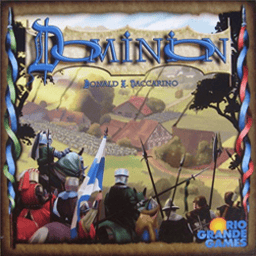
How was the first version of Dominion different from the published version?
WHEN DONALD SOLD THE GAME TO JAY, HE HAD 300 KINGDOM CARDS IN A GIANT SUITCASE.
There was not a set of 25 Kingdom cards. We went through it all. What 25 cards are going to be the best to show off the game? We saw expansions for the future. If the game wasn’t a success, then people wouldn’t buy expansions. We picked which cards would show off the game the best. Donald hadn’t developed the Duration cards yet. Those hadn’t been thought of yet. These were 300 basic action cards. Once we had [our 25 Kingdom cards], we chose the ten Kingdom cards for your first [introductory] game.
There was a lot of moving back and forth of how many cards in each pile and how the game ended (any 3 piles ran out). As we kept playing, we realized that wasn’t a great end game mechanic. The Victory Points were 1, 3 and 5. We decided to make the Province an extra boost to 6. We did an arithmetic boost. That seemed to improve the game play and pushed people to Provinces as the way to score points. Donald had provided us with a great game. Would it have done well on its own? It would have. We streamlined the game. People wouldn’t have wanted the cost of 2500 cards for a game they didn’t know.
What is Donald’s design process like and how do you work with him?
We were pretty hands on. We communicated a lot. He had his group in Berkeley, CA. He has been working on these games for years. He pitched them all to Jay. I saw Dominion, another game that became Infiltration and other card-based games. We were in constant contact with Donald trying to improve the game. Some things he didn’t agree at first. We said try it out with your group and see what you think. Some of our changes stuck and some didn’t. We did a lot of playtesting together. Donald wrote a DOS- based Dominion game, a text version of the game, which we could play together. Then a friend of his wrote another Dominion program which we could play together and play 20 games at a time.
Did you have a sense that Dominion would be as popular and successful as it became?
From the very first time I worked on it, you could see it was something special. It literally spawned a new genre of games. I played Magic and was familiar with cards with actions on it. The idea of building your deck on the fly was such a fascinating idea. As I brought around my suitcase to different conventions, you would see the amazement in people’s eyes as they played the game for the first time.
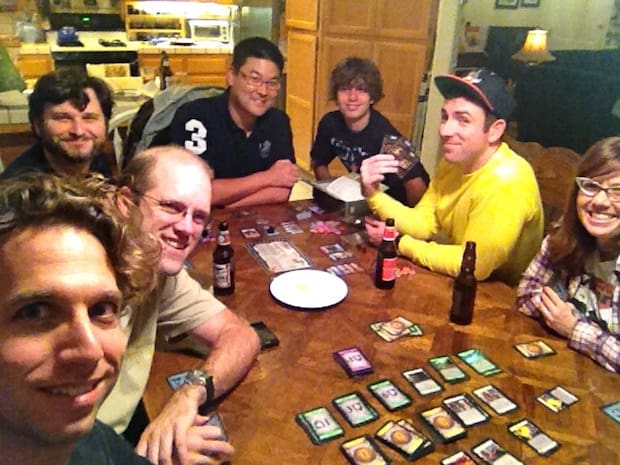
What do you see is the key to Dominion’s ongoing success and what can other designers learn from it?
Dominion had novelty. It was the first deck builder. To be the first in anything helps. You become the industry standard. Everyone compares each deck builder to Dominion. The game is addictive since the turns are so fast and you are constantly engaged in the game. The setup offers you so much variety. It’s not the sort of game that people get tired of. There are plenty of other deck builders that have taken the idea and moved it in other directions. It is one of those games you can pull out and everyone will have played it. Donald has introduced new ideas to keep the game play fresh. In other franchises, the new expansions take it away from the core idea of the game.
As a successful designer yourself with a Kinderspiel nominee, which hat do you prefer, game designer or developer?
I prefer developer, honestly. I really enjoy the idea of deconstructing a game and improving it. I don’t feel like I have great design ideas. But if you sit me down with a prototype, I will have 20 ideas on what will make it better. I enjoy the thought process behind the development. I like to think how these mechanics work with each other. I understand which parts make a game work and which parts are extraneous and should be chopped out.
Does every game designer need a developer, and do you use one for your games?
I don’t think every game needs a developer. It’s helpful to have someone who isn’t emotionally tied to the game look at it with [fresh] eyes in case there is something you don’t see. With the games I designed, yes, I did have a developer. Nobody wants to lose control of their game. Developers might be looking to fix rules or finding an appropriate theme or art for the market. It helps a publisher end up with a game that it wants. It’s got to be a game that the publisher wants to publish.
What advice would you give to someone who wants to become a board game developer?
I stumbled into it. It’s become a second job. Most developers are in-house salaried employees. In the big German publishing houses, all developers are employees of the company. It is their job to look at the games and touch them up. Over there, they are held in high esteem. They don’t always get credit in the rule book. Make friends with a publisher and see if they need help. I literally stumbled in it. Have great friends like Valerie.
How many board game conventions do you attend every year?
I usually go the Gathering of Friends in April. I go to Origins and GenCon for 2 days each. I go to Essen every year for a week. I go to Gulf Games, a regional invitational. It’s twice a year. As an Admin for BGG, I could go to BGG.con, but it’s hard to get away.
Describe the life of a board game journalist at a convention.
Plenty of people get press passes. I work with people I know over the years. I used to request meetings with all of the publishers, but now they are writing me to make sure we meet up. A lot of people think it is weird that I don’t play a single published game while I at Essen. I spend most of my time in meetings. Often, I will sit aside an hour per publisher. We will talk about all new releases. Maybe set up a game and play a round or two. At Essen, we are talking about games coming out at Nuremberg. Everything is about advance hype. At Nuremberg, they have new games and are already showing off the next cycle [of games]. I go booth to booth. For example, your game, Voluspa, I saw at GenCon. Stephen Buonocore [of Stronghold Games] pulled me aside and gave me the elevator pitch. I came home from Essen [this year] with 80 new games. It’s really hard to play 80 games 3 times each and write about them. It’s almost Valentine’s Day and I am still writing reviews from Essen.
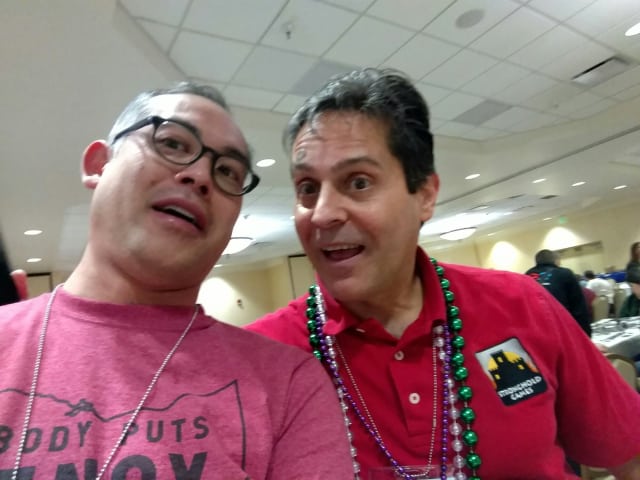
Dale with Stephen Buonocore of Stronghold Games
How do you keep your sanity at conventions?
I don’t have a problem with that. I am an outgoing guy. It’s a great chance to see friends that I only see at conventions. I tend not to get fatigued as I am not grinding playing games. I just talk to people. It’s a different view if you are working a booth. You have to have your game face on the whole time. You have to be selling your game all the time. I am lucky to know enough people and find a place to rest.
What advice would you give someone wanting to become a board game journalist?
It’s determination. You have to want to do it. You have to willing to commit the time and do it. The base rate for a blog is $22 per year. Do you have enough content to be interesting and keep people coming back? That’s why we have 30 writers. We don’t have scheduled times. If you want to write something, find an empty day on the calendar and write it. One of our new writers, Eric Edens, decided he wanted to do videos on his own YouTube channel. He does 1 review per week. As long as you have regular content and are interesting, you will find an audience. There are free blogs on BoardGameGeek. There are people who were not insiders when they started, but now people know them like Mina’s Fresh Cardboard and Stephanie’s All the Meeples of the Rainbow on BoardGameGeek.
What is the Gathering of Friends and how did you get invited?
The Gathering of Friends is annual convention in the spring run by Alan Moon, designer of Ticket to Ride. It started out as a gathering of his friends. It’s been going for 30 years. There is a nomination process now for new people. Back in the day, I managed to hook up in a group that played Acquire via text email. Stephen Glenn, designer of Balloon Cup, was the ring leader. He designed a 12×12 text board. He would update the board and send it to the next person who would take his turn. Stephen met Alan as the result of Balloon Cup. Stephen got invited and was kind enough to introduce me to Alan.
Most people [at the Gathering of Friends] are a friend of a friend who knows Alan. It’s an exclusive group and I am lucky to be part of.
IT’S ONE OF THE GAMING HIGHLIGHTS OF THE YEAR. THERE ARE LOTS OF COMPANIES THAT GO THERE. I CAN GO FOR 4-5 DAYS BUT IT GOES 10-11 DAYS. IT’S JUST 10 DAYS TO PLAY GAMES WITH YOUR FRIENDS.
It’s pretty awesome. There is no game library. Games are there that people bring. A lot of the new games from Nuremburg are played for the first time there. Game companies bring their new games. I got to play the First Class prototype for the first time [last year].
How many years have you attended the Gathering of Friends and how has the event changed?
This will be my 15th,16th year. I have made a lot of good friends there. When I started going, I would wake as soon as I could, play as many games as I could, go until I couldn’t keep my eyes open and then do it again the next day. Now, I try to play the new games. Now, I try to do things that aren’t gaming with friends. That’s a behavior for people going for the last 5 -6 years.
How many years have you been going to Essen and how has it changed?
My first Essen was 2002. I have been every year except one. The square footage has probably doubled since 2002. It’s a gigantic convention now. It’s a different animal than GenCon or Origins. Unlike those two which have a lot of space to play games, Essen is a giant dealer hall. Last year there were 900 new games on display at Essen. That number gets bigger every year. [Essen has] gotten bigger and more populated. In the first 5-6 years, I was just a tourist. As I became part of the industry, [Essen is] mostly meetings now. A publisher might ask me if I want to develop a game. Sometimes I go to a booth to help promote a game I worked on. I have a more structured schedule at Essen. Most of my schedule is predetermined before I even get on the plane to go to Essen.
Is Essen really worth the expense to go for American gamers?
Two answers. Yes and no. From the fan boy sense: yes. Everyone should go. It is an experience unlike anything else. It is an experience that is attainable. Anyone can go to Essen. There is so much excitement and hype around it.
IF YOU WERE A COLLEGE BASKETBALL FAN, IT’S LIKE GOING TO THE FINAL FOUR.
There are so many things to see and experience. Even if I wasn’t doing the blog, I would still go.
The “no” part is it is a very expensive trip. It’s a once in a lifetime for most people. Since 2012, there is almost no game shown at Essen that you can’t get in the States now. Given the expense of Essen, even shipping costs don’t see so bad. [Essen] is no longer for game acquisition.
Can the industry really keep growing at this rate?
Certainly, the sky is the limit. especially in the US. There is a cultural change toward board gaming. You see board games in mainstream media, in sitcoms like the Big Bang Theory which have board games on the table. You can walk into the board game aisle in Target and it’s as good as the selection of games at hobby stores. Even Walmart is starting to sell these games. Exposure is just increasing.
WHO WOULD HAVE THOUGHT YOU COULD WALK INTO A TARGET TO BUY DOMINION AND PANDEMIC?
How do you view the consolidation by Asmodee?
It’s a business deal. I am good friends with people who run Space Cowboys, Astari, and Days of Wonder. As promised, there have been no issues with independence with designing their own games. Asmodee is the unifying way to promote and distribute games. It remains to be seen. Asmodee has bought out Heidelberger distribution in Germany. Now, they will be one of the largest distributor and publisher. Will this be bad for the consumer? I haven’t seen prices rise. [Games] may cost less.
As you noted on Opinionated Gamers, gamers on BoardGameGeek seem to have a bias toward newer games. Are games really getting better?
I don’t think games are getting necessarily better. The average game on Kickstarter is probably not better. That may be lack of development. They couldn’t find a company to publish it. That’s not to say games on Kickstarter are bad. But the ratings on BoardGameGeek are just a numbers thing. Games that get more ratings tend to do better. There are just more people rating games than ever before and more people are rating new games. There is a bias toward new games on BoardGameGeek.
Any upcoming projects you want to talk about?
Nothing on the design front. Maybe I’m retired. I am under contract with Bezier Games working on a new stand-alone game and maybe some new expansions. [The stand-alone game] may be an Essen release. We will see how it goes over the next 8 weeks.

All photos courtesy of Dale Yu (except for the Dominion pictures) and are used with permission.

